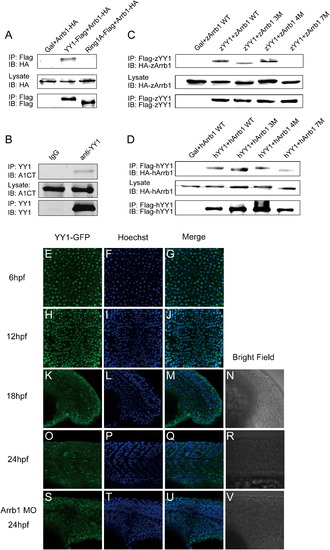Fig. 5
- ID
- ZDB-FIG-091215-24
- Publication
- Yue et al., 2009 - Beta-arrestin1 regulates zebrafish hematopoiesis through binding to YY1 and relieving polycomb group repression
- Other Figures
- All Figure Page
- Back to All Figure Page
|
β-Arrestin1 Binds to and Sequesters PcG Protein YY1 (A) β-Arrestin1 interacts with YY1 but not Ring1A in HEK293 cells. The indicated expression plasmids were used to transfect HEK293 cells. IP, immunoprecipitated; IB, immunoblot. Five percent of total lysates were loaded as controls. (B) Endogenous interaction between β-arrestin1 and YY1 in MCF7 cells. Endogenous antibody was used to immunoprecipitate YY1, β-arrestin1 was probed with β-arrestin1-specific antibody (A1CT). (C and D) β-Arrestin1 and YY1 binding mutant screening using zebrafish (C) and human (D) proteins (3M, β-arrestin1 D383, 384 and 385A; 4M, β-arrestin1 E404, 405, 406 and 407A; 7M, β-arrestin1 D383, 384, 385A, E404, 405, 406, 407A). 7M β-arrestin1 showed very little, if not any, interaction with YY1. (E–V) Zebrafish confocal microscopy analyses. 200 pg GFP-tagged zebrafish YY1 mRNA was injected into one-cell stage embryos alone or together with β-arrestin1 morpholino, and antibody staining was performed at 6 hpf (E–G, top views), 12 hpf (H–J, dorsal views with anterior to the top), 18 hpf (K–N, lateral views with anterior to the left) and 24 hpf (O–V, lateral views with anterior to the left) using an anti-GFP antibody. Hoechst staining was also performed to mark the nucleus. |
Reprinted from Cell, 139(3), Yue, R., Kang, J., Zhao, C., Hu, W., Tang, Y., Liu, X., and Pei, G., Beta-arrestin1 regulates zebrafish hematopoiesis through binding to YY1 and relieving polycomb group repression, 535-546, Copyright (2009) with permission from Elsevier. Full text @ Cell

